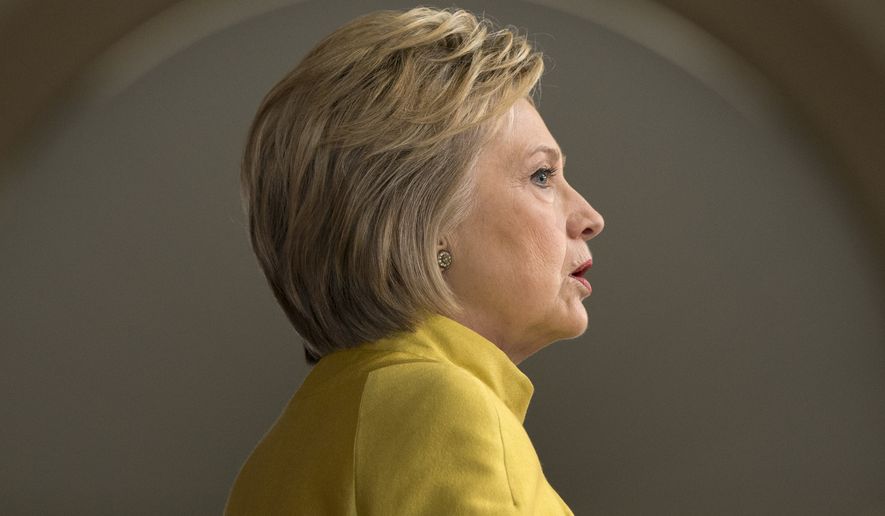Democratic presidential hopeful Hillary Clinton urged her supporters to demand that the Senate approve President Obama’s Supreme Court pick — even though she herself seemed to undercut Judge Merrick Garland, saying she wanted justices with more varied “life experience” than what he brings to the bench.
Mrs. Clinton said she wouldn’t second-guess Mr. Obama’s decision to pick Judge Garland to fill the seat left vacant by the death of Justice Antonin Scalia, but added that if she were in the Oval Office she would search for nominees in the mold of Justice Sonia Sotomayor. Mrs. Clinton said Justice Sotomayor’s Hispanic heritage and underprivileged upbringing brought needed perspectives to the high court.
Mrs. Clinton also said she would impose litmus tests on abortion and campaign finance. Her nominees, she said, would have to prove that they would uphold the Roe v. Wade decision establishing a national right to abortion and would have to show that they would overturn the Citizens United decision that established free speech campaign rights for interest groups.
“I would not appoint someone who didn’t think Roe v. Wade is settled law,” Mrs. Clinton said while campaigning in Madison, Wisconsin, where the next primary is slated for next week.
Mrs. Clinton mixed her own call to inject more civility into the judicial selection process with combative rhetoric.
She specifically called out two Republicans, Sen. Ron Johnson of Wisconsin and Sen. Chuck Grassley of Iowa, the chairman of the Judiciary Committee. Both have joined the vast majority of their Republican colleagues in saying Scalia’s seat should be filled by the next president, after voters have a say at the polls.
“You know, we chose a president. We chose him twice. And now Republicans in the Senate are acting like our votes didn’t count and President Obama is not still the nation’s leader,” she said. “Today, I’m adding my voice to the chorus asking Sen. Grassley to step up and do his job. He should hold a hearing, and he should schedule it as soon as the Senate returns from recess.”
Republicans counter that they scored huge victories in the 2014 midterm congressional elections, with voters signaling that they wanted a check on Mr. Obama. Senate Republicans say the president has the power to nominate, but it’s the Senate’s choice whether to act.
Mr. Grassley, in a statement Monday, said Mrs. Clinton’s attack on him was a campaign ploy to try to divert attention away from her secret email account during her four years as secretary of state. Both Mr. Grassley and Mr. Johnson have been investigating her emails.
Republican National Committee spokesman Michael Short said Mrs. Clinton’s attacks were odd because she herself took part in filibustering President George W. Bush’s judicial picks, including an attempted blockade on Samuel A. Alito Jr.
“The only reason Hillary Clinton is calling on Republicans to breach decades of bipartisan precedent of not confirming election-year Supreme Court nominees is so she could have a liberal majority on the court to help her carry on President Obama’s legacy of executive overreach if elected,” Mr. Short said.
Mrs. Clinton and her fellow Democrats appear to be getting the better of Republicans in the debate, though the matter is not settled among the public.
A Pew Research Center poll released Monday found that 46 percent of Americans surveyed wanted Judge Garland confirmed to the Supreme Court, while 30 percent opposed him. The rest had no opinion about the matter.
Democrats have predicted that Republicans will cave to public pressure and confirm Judge Garland, but just a few Senate Republicans have dissented from their leadership’s blockade.
Mrs. Clinton said opposition to Judge Garland is born of the same fire that is spurring the insurgent campaign of Republican presidential front-runner Donald Trump, who before the 2012 election challenged Mr. Obama’s citizenship.
“Once you make the extreme normal, you open the door to even worse,” Mrs. Clinton said. “When you have a party dead-set on demonizing the president, you may just end up with a candidate who says the president never was legally the president at all. Enough is enough. It’s time for you to take a stand.”
Still, she refused to say specifically whether she agreed with Mr. Obama’s choice of Judge Garland, and even undercut his case when she criticized presidents for nominating judges who have taken the same path to the high court.
“I would really like to find appointments where people have not just been on one narrow track — you know, out of law school, to a clerkship, out of clerkship, to a firm, maybe to a U.S. attorney’s office, and then to a firm, maybe, and into the Justice Department and then back to a firm,” she said.
She mentioned Chief Justice John G. Roberts Jr. and Justice Alito as candidates who were legally qualified but were on that “one narrow track.”
Judge Garland falls into that same description, having graduated from Harvard College, then Harvard Law School, before taking two high-profile clerkships, serving in the Justice Department, then going into private practice at a prominent law firm in Washington. He rejoined the Justice Department as assistant U.S. attorney for the District of Columbia, then went back to his law firm and then back into the Justice Department before gaining his seat in 1997 on the U.S. Circuit Court of Appeals for the District of Columbia.
Mrs. Clinton said she wouldn’t second-guess Mr. Obama’s pick but hinted that it was made in part to try to politically isolate Republicans.
• Stephen Dinan can be reached at sdinan@washingtontimes.com.




Please read our comment policy before commenting.